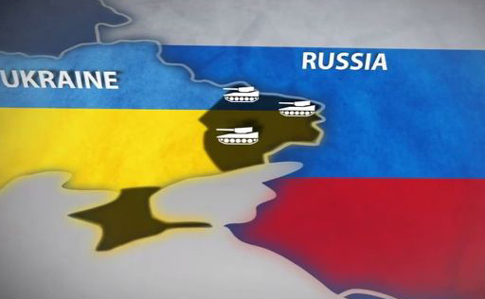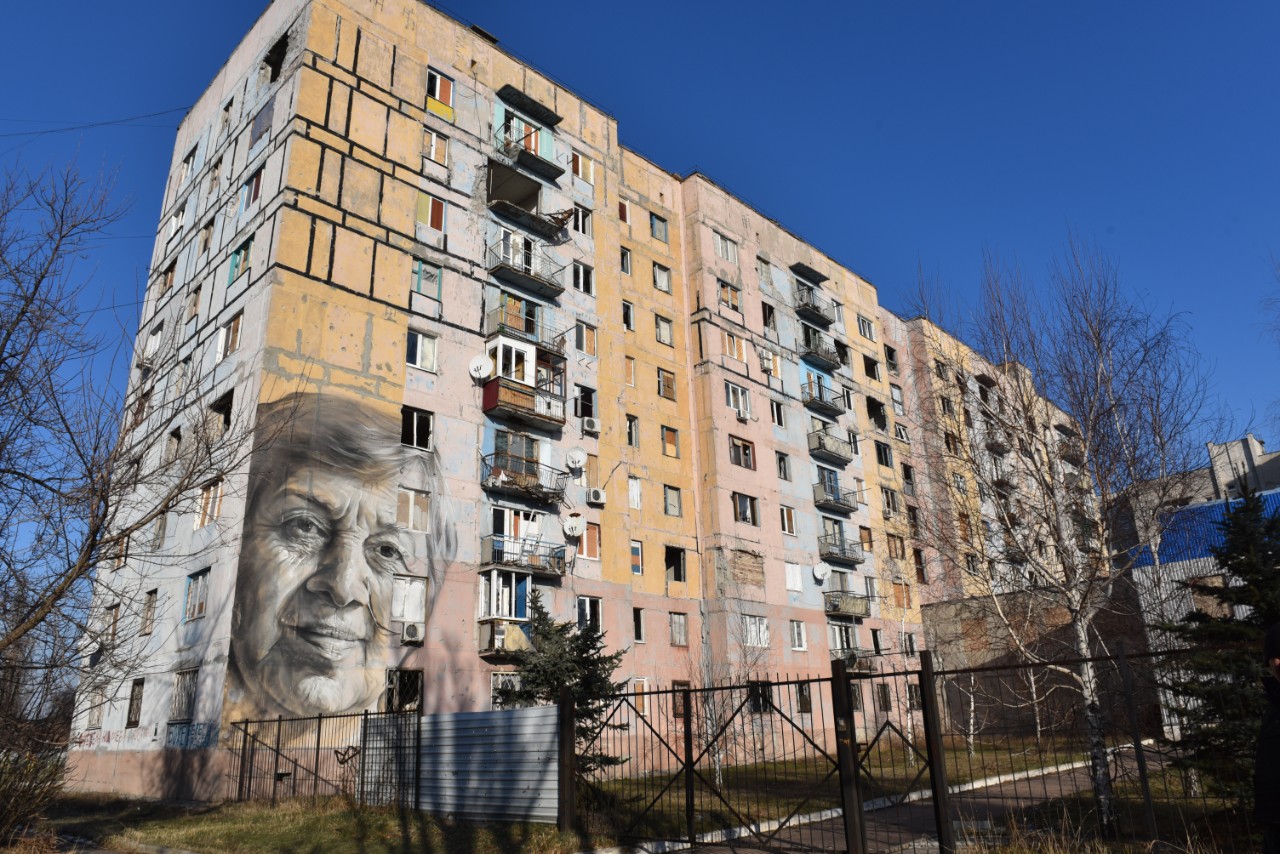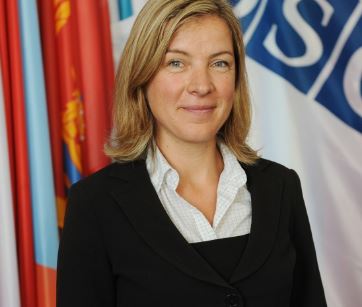
The Organization for Security and Co-operation in Europe is one of the international organizations which has significantly expanded its presence in Ukraine during the last two years. The OSCE Project Co-ordinator co-operates with Ukrainian Government on a plethora of issues. The OSCE Special Monitoring Mission (SMM) to Ukraine observes and reports on the security situation throughout Ukraine and facilitates dialogue in order to reduce tensions and foster peace, stability and security. There is also a separate mission which operates at the Russian checkpoints Gukovo and Donetsk. The missions share information with each other as needed. Recently, there have been some talks on a possible separate armed police mission; however there is no decision for such a mission.
Euromaidan Press talked to Aleška Simkić, Deputy Chief Monitor of the OSCE SMM, on the activities of the mission in Ukraine and controversial questions connected to its work in the country.
On a 24/7 mission
EP: There is a petition demanding a 24/7 mission to Donbas and extending the number of observers. Do you think such changes to the mission are possible, and if so, would they be beneficial to the resolution of the conflict?
Aleška Simkić: For security reasons, the SMM does not go out to patrol at night, as the security and safety of our monitors is a top priority for us and we have to follow certain security measures for our monitoring activities. However, there are two other ways to enhance our monitoring during the night hours.
First, technological equipment. We have long-range unmanned aerial vehicles which work at night. Unfortunately, two of them were most probably shot down recently or jammed above non-government-controlled area, and we have not yet heard that a proper investigation would be conducted and perpetrators found. So far we managed to install cameras at three locations and can already say that they are useful for recording and reporting violations that happen at the night. We also study aerial surveillance imagery available to the SMM, and will install more cameras, access permitting, which also will allow us to do 24/7 monitoring.
Second, more presence near the contact line. In addition to our team headquarters in Donetsk and Luhansk, and hubs in Kramatorsk, Mariupol, and Sievierodonetsk, we opened nine forward patrol bases in the vicinity of the contact line (in government- and non-government-controlled areas). There, we are closer to the explosions and shots and can hear them. When ceasefire violations happen, we report about them.
Talking about expanding the Mission, the number of monitors now is around 700, with almost 600 of them in the eastern regions of Donetsk and Luhansk Oblast. We are mandated for up to 1000 monitors and have assessed that we can properly implement our mandate with 800 monitors. Participating States of the OSCE have agreed with this assessment.

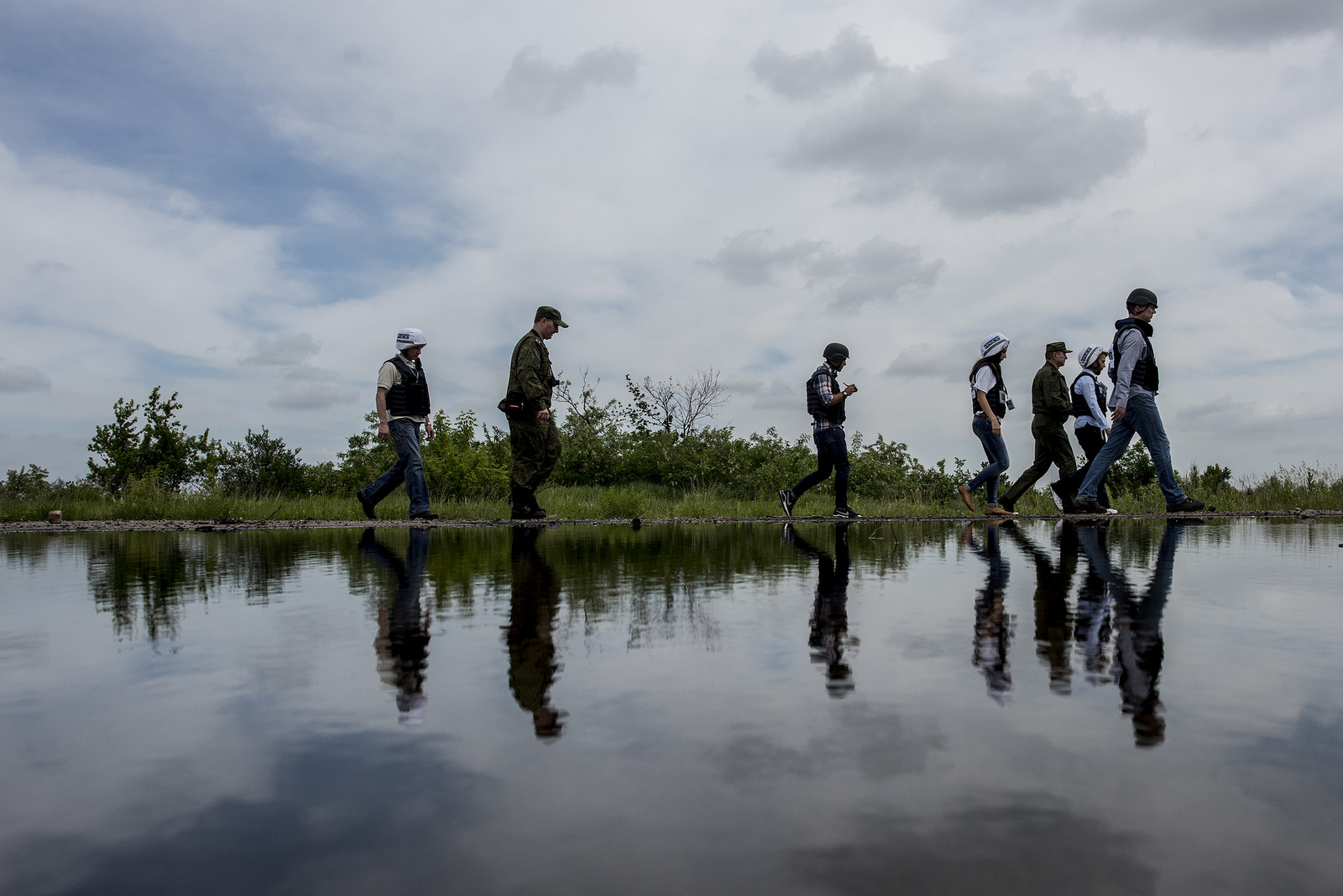
EP: Recently OSCE voiced over that there are 40 Russian observers in Ukraine. How is it possible that observers of the aggressor country can take part in the mediation of the process here? Are there any instruments to prevent it?
Aleška Simkić: There are indeed currently 40 Russian monitors in the SMM. The Russian Federation is a participating State of the OSCE and, as such, can participate in any mission except the one that is on its territory. This is the only formal requirement. Our monitors come from 45 different countries and work in multinational teams. Their reports are the collective observations of these multinational teams. At the same time, while the host country cannot deploy international monitors, there is a number of Ukrainian colleagues working for our Mission and making valuable contributions.
On sharing monitoring plans with the JCCC
EP: In the recent case of expulsion of the Russian JCCC (Joint Control and Co-ordination Centre) Head from Ukraine, his provision of OSCE drone schedules to the “DNR” military were cited as the reason. What is the interaction between the JCCC and OSCE, and is it normal for the OSCE to share such operational information with the JCCC?
Aleška Simkić: We have a lot of co-operation with the JCCC and we consider it a crucial mechanism. This is the mechanism that has been established bilaterally by Ukraine and the Russian Federation. For us, it is a source of information and – importantly – an element in the prevention of ceasefire violations. For that, we need this mechanism to work effectively and jointly. Our task is to monitor the security situation and we are in contact with them to exchange observations. Most importantly to our Mission, the role the JCCC plays in facilitating access, either facilitating/providing security guarantees to our monitoring teams, and following up on incidents where our security is impaired, is important to our work.
Unfortunately often we see that there is no full cooperation. But we hope it would be improved on the ground, as well as through agreements in Minsk. The topic of JCCC is quite often on the agenda because everybody agrees that it has an important role to play in ensuring compliance with the Minsk agreements.
We do not share operational (i.e. patrol) plans as such with anyone. Sometimes we are joined by the JCCC in particularly dangerous areas. We also inform them that we are going to these particular areas because we want security assurances from the sides. And sometimes they help us to get it.
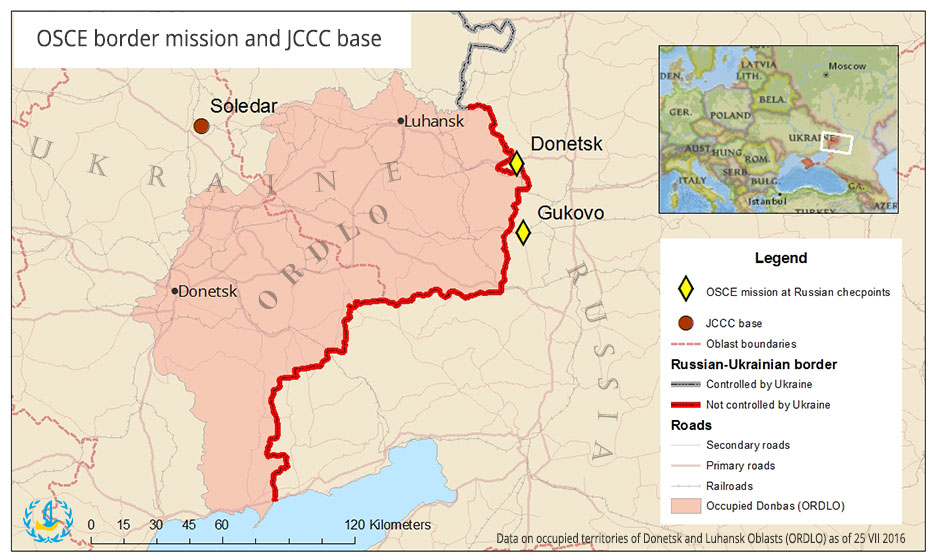
EP: Doesn’t sharing plans of what area the OSCE will monitor with Russian officers in the JCCC, some of whom are proven to back the militants from “DNR” and “LNR,” inevitably lead to higher chances of shelling taking place the at locations where the monitors are absent?
Aleška Simkić: We do not share all the plans and we ask for security assurance when going to dangerous areas. We are a civilian, unarmed mission. Involving ourselves in the middle of a battle is not our job. Our job is to monitor and then report. It is the sides that carry responsibility for preventing violations and for ensuring a ceasefire, as well as for our security and undeterred observation. Russian officers in JCCC are helpful in getting the message across to “LNR” and “DNR.”
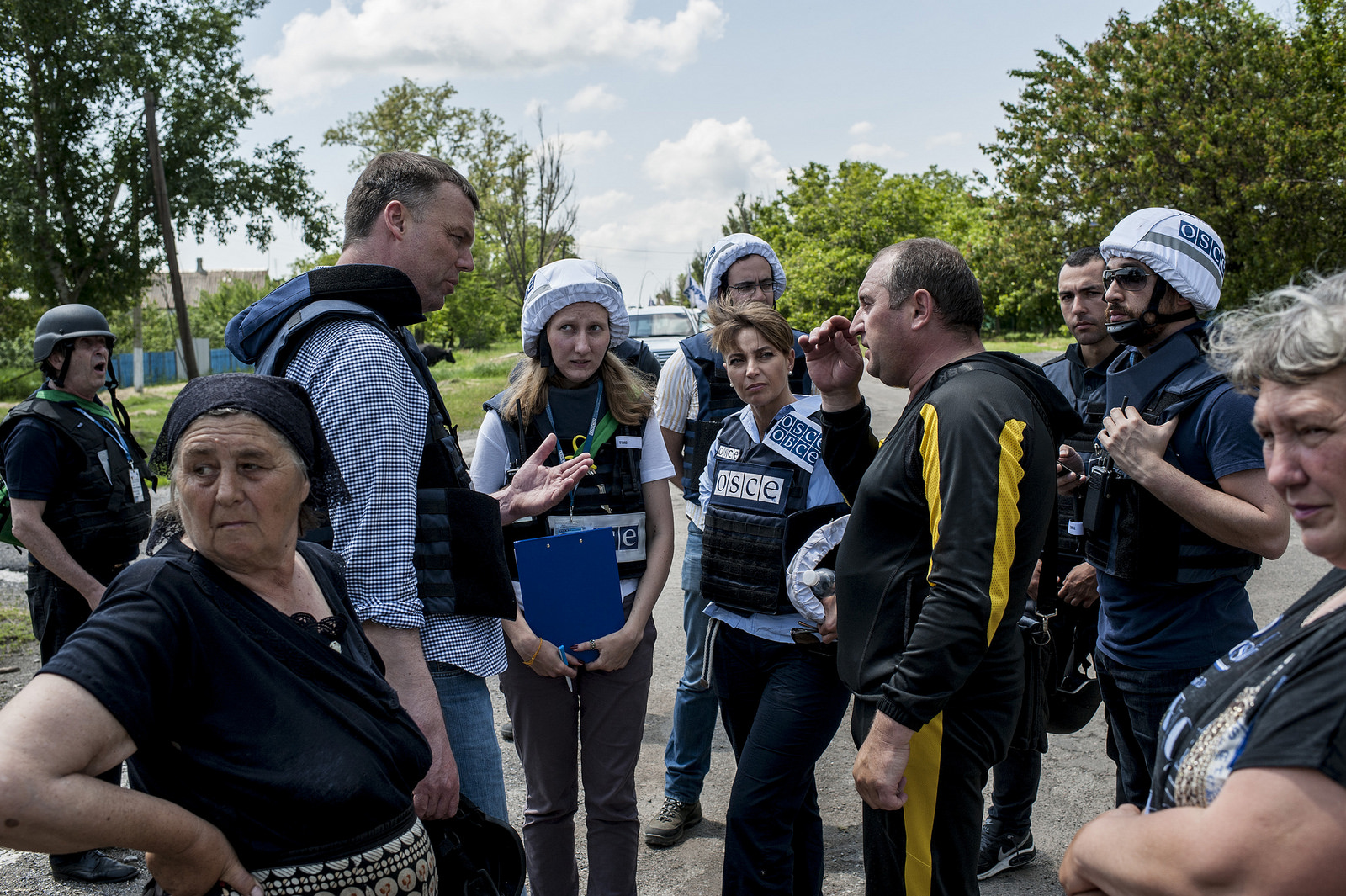
On communication with society
EP: The OSCE uses rather neutral language in its media communication. Talking about particular situations, the institution often refers to “both sides of the conflict,” not saying from which side the shelling came from. How can this neutral rhetoric help the conflict resolution?
Aleška Simkić: Our job is to report on what we see, what we hear and what we can verify. If we cannot meet those criteria, the information does not make it into our reports. Often we cannot accurately verify who is shelling or shooting; however, we include as much detail as possible in our reports. We conduct our observations and reporting this way not for the sake of neutrality, but for the sake of accuracy and to avoid being involved in speculation. Our reporting is both balanced and factual. We report what we see with our own eyes or means of observing; however, it is up to the reader, including the sides, to decide on how they use this information. We don’t hide anything - if we know it, we report on it.
EP: Unfortunately, the OSCE as a mediator has failed to prevent either the “freezing” of the conflicts in other post-Soviet countries (Armenia, Azerbaijan, Moldova) or the escalation in the Georgian case. How can you estimate the chances to not repeat such scenarios in Donbas?
Aleška Simkić: I think that OSCE is well placed, with its inclusive approach. In Ukraine, there has to be a real and sustainable ceasefire. The people on the ground do not want fighting anymore, they want life, jobs, and to be able to move freely all around Ukraine. There are media arguments that the Minsk agreements cannot be implemented, but, in my opinion, this is the only formula we have and one that has been agreed by all sides – they must honor the commitments they undertook in Minsk. Ultimately, what develops from Minsk is entirely dependent on the sides – we can only facilitate and verify.
EP: Ukrainian society has a rather negative attitude towards the mission, raising suspicions of its pro-Russian position, accusation in “not seeing” attacks etc. Do you consider it as problems or prejudice? What can be done to solve it (if problems) or to eliminate (if prejudice)?
Aleška Simkić: It is challenging for any international mission, anywhere, to prove its value to the population. And media here plays a role as well. We are accused here sometimes that we are “pro-Russian,” in other media we are accused that of being way too “pro-Ukrainian.” Then we are criticized for being indecisive. When there is no solution to the conflict, the population’s frustration increases: they have no jobs and they have no humanitarian assistance, and we as the OSCE do not have a mandate to provide any of this.
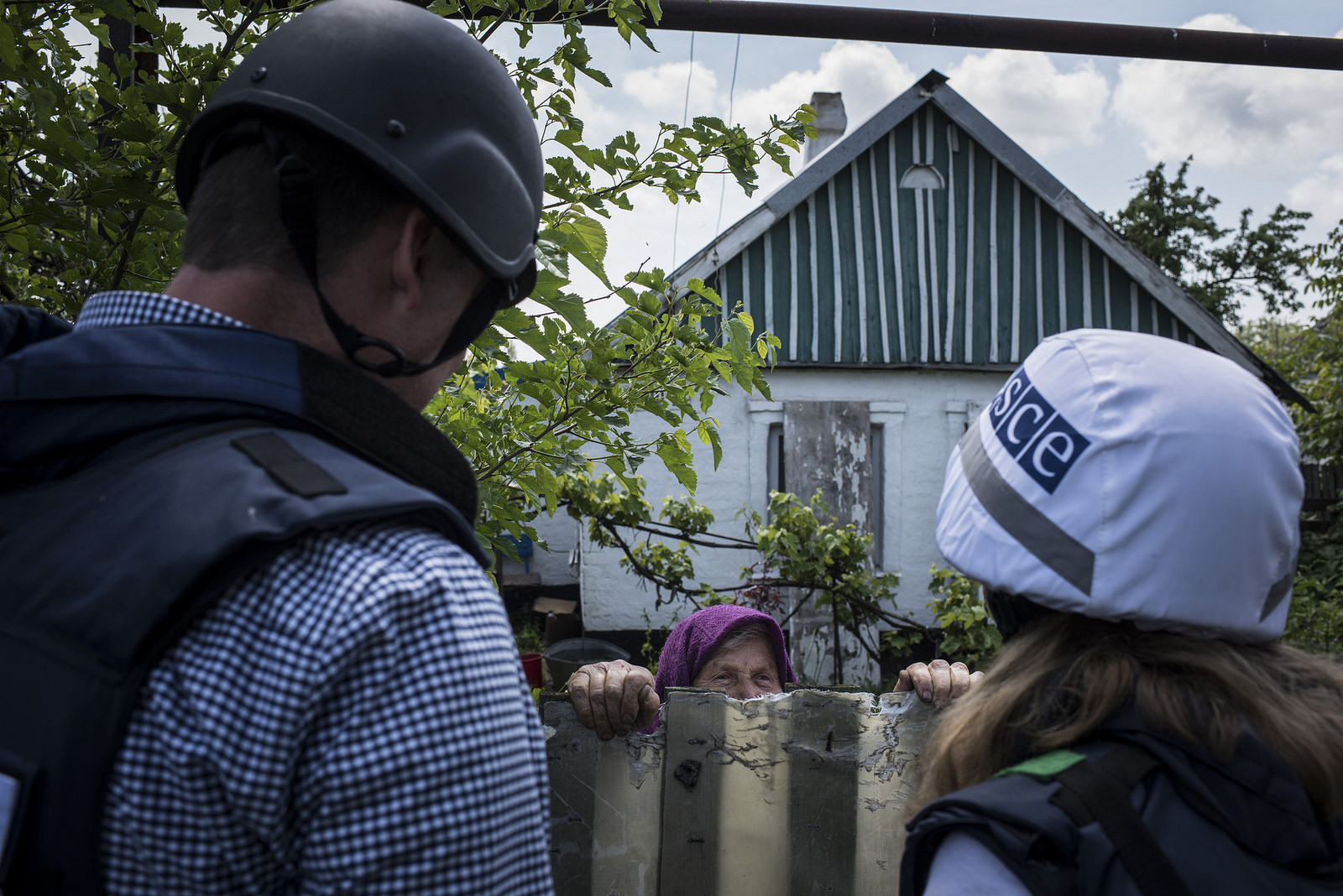
We are not a humanitarian provider, so for us, it is often very difficult to explain to the population what we are actually doing: that we are monitoring and reporting to the public, the OSCE participating states and to other international organizations. For an ordinary person who is on the conflict line, this does not mean much. So, when the situation is dire, some people may look for someone to blame. And very often this can also be the international mission because there is a large expectation that it is up to an international mission to bring peace. So what we are trying to do is to explain what we are doing and that through our reports we pass the information on what is going on to all the sides. Based on this we then hope that the political actors will bring peace to the area.
I do need to say, though, that it is all not negative. More than often we are welcomed, thanked, and seen as reducing shooting and shelling through our presence. This positive impact and attitude goes much more underreported than the negative perceptions.
EP: Why do you have difficulties to communicate what you do to people in “LNR” and “DNR”? No access to media?
Aleška Simkić: We do indeed have some difficulty communicating with people in “LNR”- and “DNR”-controlled areas through the media, as the media situation in those areas is far from free and independent. However, media is one element of communications - we also need direct access to the people. We hope that our actions will communicate for us: that we will promote our activities with our positive presence and the wide geographical spread of our monitors. While we try to reach those who are in conflict-affected areas, often we are unable to reach those people who are in difficult situations.
EP: Do you mean face-to-face communication?
Aleška Simkić: That is particularly important, as we are patrolling along the contact line where the most affected people are. Our monitors talk to the people there. Often these people have nobody else to talk to - they have no authorities coming there and asking them how they are. They talk to us and then, of course, they tell us their problems and ask for help. And we share this with those who should be aware – humanitarian organizations, various authorities, and participating States. This people-to-people contact is something which we continue to put a lot of emphasis on.
On the police mission to Donbas
EP: Recently the Ukrainian President proposed deploying an OSCE police mission to Donbas. Can you explain why such a step is needed or not?
Aleška Simkić: This is something that 57 OSCE states need to decide and get a consensus on. The Special Monitoring Mission is not a part of these discussions. We have our mandate which is monitoring and reporting on the activities and the ceasefire, contributing to stabilization and normalization, and facilitating dialogue. What has to be decided now is probably the purpose of it. The Ukrainian leadership bases its request on the belief that the armed police mission will increase security, especially in the area which is not controlled by the government and the contact line. As the president Poroshenko put it, this armed mission is to provide security for election if they happen. We will continue with our activities, we ourselves like the fact that we are a civilian mission. That is what I think keeps us also impartial, neutral, and mostly safe. But if there will be another mission, of course we will cooperate.
EP: Do you know the position of Russian side on this mission? Their statements change all the time.
Aleška Simkić: From what I understand, all the countries are more or less saying that they are ready to consider it, they are looking into options. OSCE is a consensus organization, so when it comes to the details, a lot of negotiations on how, where, when, how many will be needed. All 57 participating states of the OSCE have to agree on mandate and scope of any kind of a new mission, or for changing the mandate of an existing mission.
EP: Why can't the “consensus minus one” and “consensus minus two” rule, when decisions could be taken without the consent of the States concerned, be implemented in Donbas?
Aleška Simkić: It has been used once in 1992 against Yugoslavia (suspension from the work of the then OSCE). But, since then, the full consensus rule has been strictly implemented and there actually is no consensus “minus one” and “minus two” in the OSCE rules. There are every now and then the ideas of some that if a country is a part of the conflict, then they should not have a say, or if two countries are involved in a conflict that affects the security of Europe, the two should not have a veto. But it has never been supported, on the contrary. After all, you need a consensus to change a consensus rule.
Related:
- The OSCE silently pushing Russia's Eurasian project
- EU and OSCE note unprecedented violence escalation in Donbas
- OSCE getting more "neutral"
- OSCE hated by all sides of conflict: letter from occupied Donbas
- Russia's hybrid war on OSCE observers in Donbas
- What do the attacks on the OSCE mean?
- OSCE Parliamentary Assembly condemns Russia's role in Ukraine
- Human rights advocate detained by militants: OSCE betrayed us
- OSCE bans exhibition on Crimea
- OSCE leader is tired of restraints to Ukraine mission by separatists


